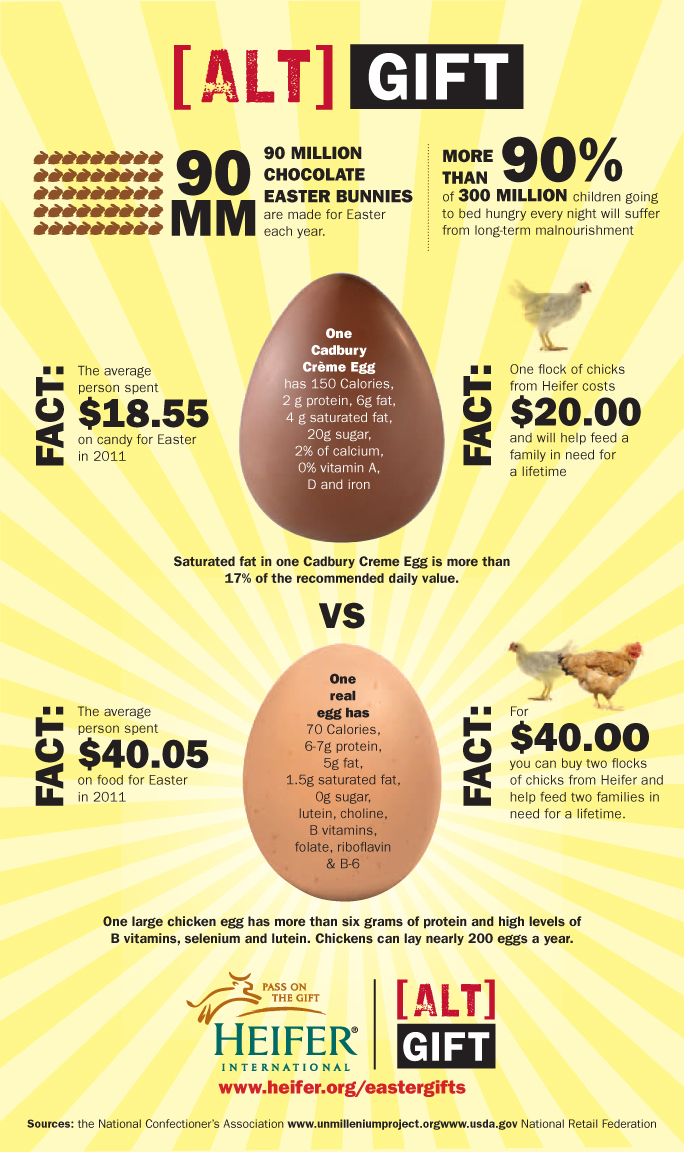
This weekend, roughly 2 billion Christians around the world will celebrate one of the most important religious holidays of the year. Along with the celebration of Resurrection, many of those celebrations will involve chocolate rabbits, brunch, new spring outfits, dyed eggs, plastic grass or jellybeans. In the United States, Easter is on the rise in capturing consumer dollars (this year is estimated to bring in a whopping $16 billion for retailers)
I have fond memories of my Easter celebrations and baskets growing up. But when I step back and look at the bigger picture, I have to wonder: is this really how we want to spend all $16 billion?
Without being terribly grim and boring you with a load of statistics, maybe I can be a tiny voice of reason during the lead-up to Easter: there are a lot of problems out there that could use your attention, and, yes, some of your dollars. Cancer, HIV/AIDS, pollution, genocide, poor education systems, a global water crisis, species extinction, climate change, I could keep going.
I think a struggle for many of us is failing to make our purchases count. We don't often enough think of the dollars we spend as investments. When major holidays come around, we spend billions of dollars on gifts, food, candy and decorations. Yes, they help us celebrate the holiday and make memories with our families and friends. In this age of connectivity, however, we know more about the other members of our global family than ever before: they are suffering and we are in a position to help.
I'm not suggesting we all give up Easter baskets or new outfits this year. But what if we diverted just a little of that $16 billion to investments with a lasting, positive impact on the world? In honor of our children, who will inherit the problems we leave behind, what if we looked for alternatives to at least some of the candy, stuffed animals and plastic eggs this year?
Investing in another family, particularly an impoverished family, is one alternative with an incredible return on investment. One family in Cambodia, for example, once barely scraped by on income from silk weaving and seasonal farming. The husband migrated to the capital city, Phnom Penh, to find work as a motorbike taxi driver, leaving his wife at home to care for their two children.
The wife, Mrs. Yuk, became a Heifer International project participant and received two pigs, vegetable seeds and tree saplings. She went to trainings in financial management, literacy, women's rights, animal husbandry and home gardening. She cared for her pigs, and they gave birth to many piglets. She sold a few piglets for additional income and purchased animal feed to fatten the remaining piglets. Her achievements became the motivation needed to expand her efforts.
Mrs. Yuk now focuses most of her time on animal production. To expand her small farming business, she has invested part of her profits in poultry, in addition to the pigs being raised. Her husband moved home to help his wife's growing business. The couple has enlarged their business to install a rice mill and stove to produce local rice wine for additional income (they use the waste from rice wine production as feed for their animals). Mrs. Yuk can now not only feed her family a healthy diet every single day, she will be able to afford for her two children to finish their education at the university in Phnom Penh, after they finish high school.
Through the modest investment of pigs, vegetable seeds and tree saplings, this family went from barely covering their daily household expenses to continually expanding their small farm business. It's the ultimate teach-a-woman-to-fish story. What's more, as part of the Heifer project, the gifts they received are paid forward?-through Heifer's unique practice of Passing on the Gift?-to another family in the community, multiplying the original investment and turning Mrs. Yuk and her family into donors themselves.
Like I said, don't throw out the Easter baskets or deny your kids the fun of an Easter egg hunt. But when you're getting ready to celebrate Easter and everything it means-Resurrection, rebirth, spring, a chance at a new life?-consider including in those Easter baskets the alternative gift that can alter another family's life forever.
I'm not suggesting we all give up Easter baskets or new outfits this year. But what if we diverted just a little of that $16 billion to investments with a lasting, positive impact on the world?
?
Follow Brooke Edwards on Twitter: www.twitter.com/@Heifer
sam shepard sam shepard johnny knox johnny knox monday night football monday night football bonjovi
No comments:
Post a Comment
Note: Only a member of this blog may post a comment.